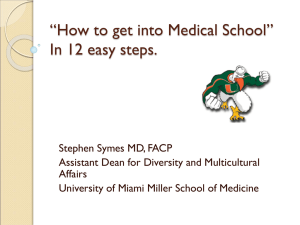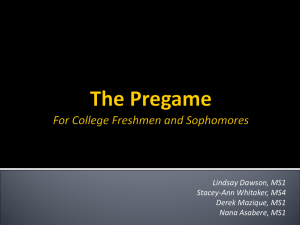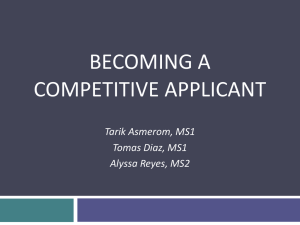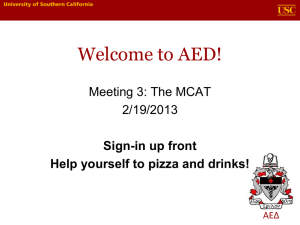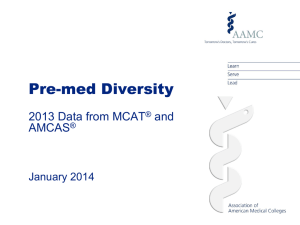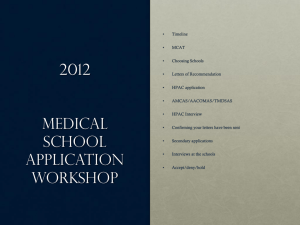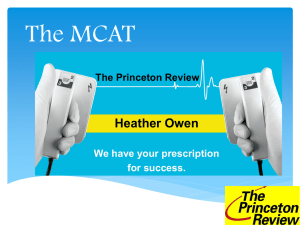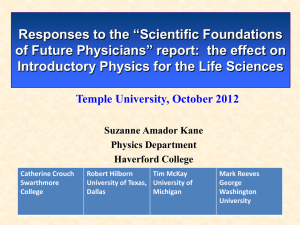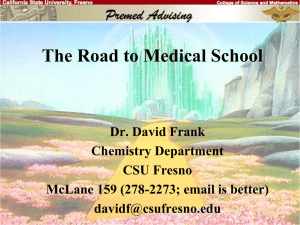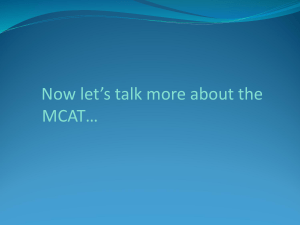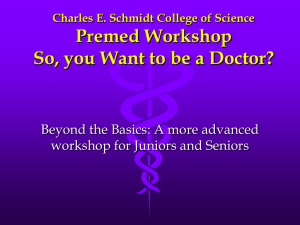Getting Ready to Apply for College Juniors and Seniors
advertisement
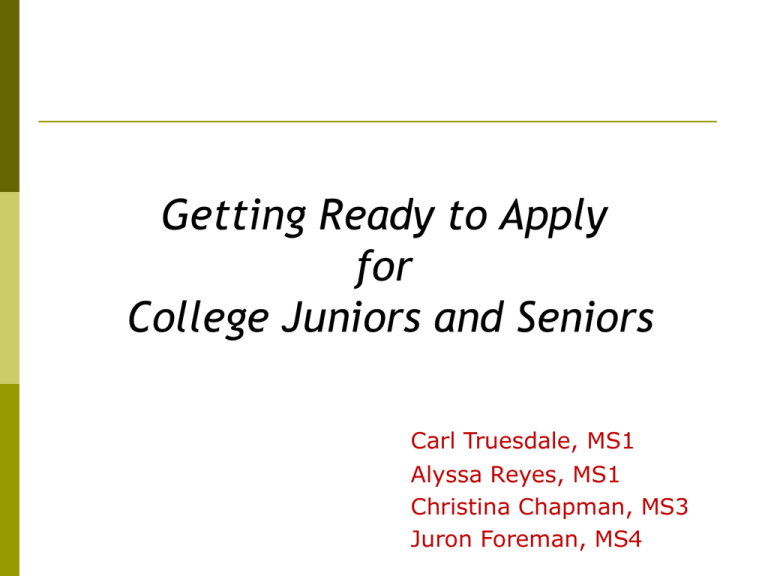
Getting Ready to Apply for College Juniors and Seniors Carl Truesdale, MS1 Alyssa Reyes, MS1 Christina Chapman, MS3 Juron Foreman, MS4 In spite of variability, here are some basics which helped all of us succeed: THE PREGAME Gather Information & Utilize Resources Rule #1: Get Organized!!! Estimate COSTS (and SAVE if you can) Learn the Application Process Know the Deadlines Gather Information & Utilize Resources Register with AspiringDocs for information, guidance, and inspiration about preparation for medical school and medical careers. http://www.AspiringDocs.org Read “Monetary Decisions for Medical Doctors,” which assists premedical and medial students in their planning for the financial aspects of their medical education. http://www.aamc.org/md2 Gather Information & Utilize Resources Read AAMC publications and admissions web sites for medical schools of interest * Medical School Admission Requirements (MSAR) – Become familiar with admission requirements, curriculum, school’s mission, first year class profile, financing, etc. * Minority Student Opportunities in US Medical Schools (MOUSMS) – Learn about recruitment, applicant and matriculant data by gender, race and ethnicity; summer programs, educational partnerships, etc. Gather Information & Utilize Resources Confer with premed advisors, mentors, and medical students who can support you through the application process. Attend a medical school recruitment fair to learn from representatives about their schools http://www.aamc.org/calendar/careerfairs The Numbers Medical School Admission Committees WILL NOT read every applicant’s personal statement and the rest of the application. Every school has to screen its applications to reduce the number of applications they actually have to read. Once the screening process is done, then they start reading the applications. Let’s talk about the numbers… Presented by Carl Truesdale, Contributions by Christina Chapman, Derek Mazique, Alyssa Reyes, MS1 MS3 MS1 MS1 General Tips on the MCAT As we’ve said, the MCAT does matter – don’t be fooled into thinking it doesn’t! Aim to take the MCAT once – Why? All schools calculate multiple MCAT’s differently… Last score Average all of scores Best sub-score in each category A lesson learned… MCAT Stress Janell was a junior and studied for the MCAT for two months. She hadn’t taken organic chemistry yet but heard it was only a minor part of the test, so she wasn’t worried. To prepare for the biology section, she studied intently from her dusty biology book that she used freshmen year for Bio 101. She registered a month before the test, and was surprised when she got put at a testing site 1 hour away and had to wake up early on testing day. When her scores came back, she felt frustrated as she got seven points below the average for her target school. How can we help Janell? MCAT: The Inside Scoop Learn about the subject areas tested in the MCAT Take all classes, biology, chemistry, organic chemistry, and physics before taking the MCAT Create a MCAT study schedule and stick to it Take an MCAT prep course or study from review books made specifically for the MCAT as not all subjects are covered in college courses Look for summer programs or scholarships that provide free or reduced MCAT prep Register early and sign up with the AAMC Medical Minority Applicant Registry (Med-Mar) Program when you take the MCAT Med-Mar is for applicants who are from groups which are underrepresented in medicine or who are economically disadvantaged. The registry distributes biographical information about examinees and their MCAT scores to diversity/multicultural and admissions offices of medicals schools interested in increasing opportunities for applicants who are underrepresented or are economically disadvantaged. MCAT: The Inside Scoop cont’d Study, seriously, not the type where you sit in the library and talk to your friends Do lots and lots and lots of practice MCAT’s – http://www.aamc.org/students/mcat/practicetests.htm Don’t resort to calling yourself a “bad test taker” Read explanations for all correct and incorrect answer choices MCAT: Test Day and Beyond Get sleep the night before If you get stuck on a problem, move on and come back to it later Pace yourself with a watch Continue to live life while your wait for your scores Retake if necessary, but study harder, or else your score will be unlikely to improve Alyssa Reyes, MS1 American Medical College Application Service (AMCAS) Centralized application service through the AAMC Available online in mid-May of your application year www.aamc.org/students/amcas/start.htm Can submit AMCAS in early June Sections of the AMCAS 1. 2. 3. 4. 5. 6. 7. 8. 9. Identifying Information Schools Attended Biographic Information Course Work Work and Activities Letters of Evaluation Medical Schools Essay(s) Standardized Tests Work and Activities Average hours per week Description of your experiences Key point: Frame in context of how skills acquired/lessons learned will make you a better physician! Get creative! Letters of Evaluation(a.k.a recommendation) Required: 2 letters from instructors in science courses 1 letter from instructor in a non-science course Extras: Pre-med advising office Coaches, deans, research P.I.’s You can have up to 10 letters of recommendation (not recommended!) Letters of Evaluation cont’d Choose individuals who know you well and who will write very favorable letters of recommendation for you Investigate if your school has a pre-health committee assigned to write a cover letter providing an overall recommendation of you along with individual letters of recommendation If possible, your letter packet should include recommendations representing both academic and non-academic accomplishments Letters of Evaluation cont’d Prepare a portfolio (resume, personal statement, self-addressed envelope to the office where the letter must be sent) for the writer Request your individual letters of recommendation EARLY! Follow up with the letter writer and make sure that your letter is on file at the pre-health office or career center Personal Statement Leave lots of time to write it Have many, many people read it (e.g. writing tutor) Make the admissions committee want to meet you! NOTE: MD/PhD applicants have 3 essays 1. Personal statement 2. Significant research experience 3. “Why do I want to do this?” Anything Else? Primary application: The AMCAS Submit one set of application materials to AMCAS, which verifies transcripts and forwards application to the medical schools that you indicate. Secondary applications Most schools send you a supplementary application (usually requires additional fees and essays). How much does it cost to apply to medical school? Primary application: The AMCAS $160 for the first school and $32 for each additional school NOTE: Not all schools use AMCAS, so these (i.e. Texas) schools might have different fees. Secondary applications Fees range from $25 to $100 Other expenses: Travel and overnight accommodations for medical school interviews, suit, MCAT prep course, etc. (Source: “The Cost of Applying to Medical School,” aamc.org) Ways to save money while applying AAMC Fee Assistance Program (FAP) Reduction of MCAT registration fee from $235 to $85 Waiver of application fee for submission of completed AMCAS application to a maximum of 14 schools. (Applicants pay an additional fee for each school beyond the 14 free applications.) Total family income must be 300 percent or less of the poverty level for their family size to be eligible (For more information, go to https://www.aamc.org/students/applying/fap/) Make use of student hosting programs Juron Foreman, MS4 The Interview: Making a Good Impression Good for ALL professional situations, in college even before you interview Begin with a firm handshake Address interviewer with their correct title (Dr., etc) Wait to be invited to be seated Maintain eye contact Be conscious of nonverbal communication LISTEN Laugh, smile when appropriate! (It’s ok to have a personality) BE CONFIDENT! BE YOURSELF! The Interview: Making the Most of Your Time Answer questions concisely, but fully, highlighting positives Use negative experiences as learning experiences and weaknesses as potential areas of growth Be willing to converse about shared interests Have questions available that demonstrate interest in the program, without appearing aggressive or negative Interviewing 101 BE ENTHUSIASTIC!! Be polite to EVERYONE – The interview starts with your response to the invitation Know what you like about the school, and why you’d be a good fit Make all interactions a positive experience Interviewing 101 5 DEADLY INTERVIEW MISTAKES TO AVOID AT ALL COSTS Being Late Being Rude or Aggressive Being Inappropriate at any point during your time at a new place Appearing bored or uninterested (including falling asleep during presentations) Answering your phone at the wrong time Interview Attire Women *Suit – black, blue, or tan Closed toe shoes (comfortable) *Groomed hair Clean Nails Light Perfume (if any) Conservative jewelry *nothing flashy or that stands out Interview Attire cont’d Men Suit – black, blue, or gray Dark socks Polished shoes Light cologne (if any) Clean cuts Interview Budgeting Create a Airfare – you are responsible for travel expenses Try to arrange interviews in same region around the same time Lodging – unless otherwise indicated Budget EARLY accounting for: Room w/ family, friends, students to cut costs Suits, shoes, portfolios Last minute interviews that may arise Interviewing 101 Other Especially this first point tips: Make sure your phone is on SILENT or OFF throughout your interview day. Be aware of your surroundings Keep mints, mirror, comb, brush, etc., available for after lunches, dinners, etc. Save space in your budget (next slide); and carry enough cash with you Enjoy Yourself!! Questions? Keep in touch! Juron Foreman, MS4 juronsf@mail.med.upenn.edu Christina Chapman, MS3 cchap@mail.med.upenn.edu Derek Mazique, MS1 mazique@mail.med.upenn.edu Alyssa Reyes, MS1 alreyes@mail.med.upenn.edu Carl Truesdale, MS1 carltru@mail.med.upenn.edu
